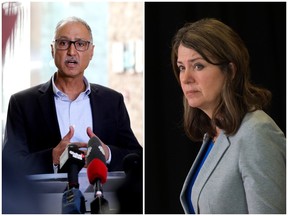
Article content
My main reaction to the provincial government bringing in a new law clearing the way for political parties to run in our municipal elections? I can see a ‘tax freeze’ slate dominating Edmonton’s next civic election.
The outrage over Edmonton city council’s spending and its new 8.9. per cent tax increase is likely to be sticky, perhaps even top-of-mind, for many voters in October 2025.
Advertisement 2
Article content
Article content
Voters may see no other way to enforce fiscal discipline on city council than voting for a slate of tax freeze warriors, and the province’s new rules will make it that much easier to identify and to hold to account such anti-tax candidates.
The changes to our municipal system now pushed by Danielle Smith’s government have major warts. But they are going to shake the earth in municipal elections, even if the United Conservatives are downplaying their significance. The UCP is pushing the notion that political party organizing and influence already impacts civic elections. “I think they’re a natural evolution of where things are going,” said Municipal Affairs Minister Ric McIver of the reforms.
I see a seismic shift. For example in the 2021 civic election there were five main candidates for Edmonton mayor, but only one of them, Amarjeet Sohi, was centre left. Each of the other four, Mike Nickel, Kim Krushell, Michael Oshry and Cheryll Watson, were centre right. Sohi got 45 per cent of the votes, the centre right candidates taking 51 per cent.
If there had been civic political parties in place at that time, the centre right in Alberta would likely have identified one candidate to lead that slate. Other centre right candidates might well have then dropped out, making it more likely that centre right voters would vote for the party candidate and elect her or him as mayor.
Article content
Advertisement 3
Article content
A major driver of Smith’s government in bringing in this change is the UCP fear that the current system isn’t working to elect conservative municipal leaders in Edmonton and Calgary, thus filling city councils with a majority of leftists bent on working with the Trudeau Liberals in Ottawa to bring in climate change initiatives, racial quotas in hiring and promoting, and policies permitting a free government supply of narcotics for hardcore users.
Without any doubt the New Democrats have used school board elections as a way to introduce promising socialist candidates like Michael Janz, Nathan Ip and Sarah Hoffman to the public.
I say more power to the NDP. That party identified an ethical and sensible farm system to develop budding political leaders. Their plan has worked to get their people elected to higher office. The Conservatives have been bumbling and sleepy in this same regard.
The downside of moving to a party system at the local level is that it limits the independence of councillors. The local government system will become less collaborative, more partisan, less subtle and flexible, more rigid and divided. Would Edmonton’s hugely popular Downtown arena ever have been funded if centre left candidates like Sohi, Ben Henderson and Don Iveson had been whipped into adhering to an anti-arena funding party line?
Advertisement 4
Article content
The new UCP rules will also tighten up the voting process, including banning the use of all electronic vote counters.
Electronic vote counters are a reliable and efficient way to count paper ballots. The Canadian voting system — which demands proper ID, makes it difficult to harvest mail-in ballots, and does not permit electronic, non-paper ballot voting — is outstanding.
I see no need to axe electronic voters counters. But, evidently, fears of having an untrustworthy and unverifiable voting system, the kind seen in some American jurisdictions, have leaked north of the border, with electronic voting counters now the sacrificial lamb.
I asked McIver if he thinks the mistrust around electronic vote counting machines is in any way valid.
“My belief is irrelevant,” McIver said, noting that some people don’t trust these machines and that is what matters. “What matters is that Albertans the morning after the election believe in their heart that everyone that takes a seat in their local council is the one that got the most legitimate votes from within their jurisdiction. Nothing else even comes close to being as important as that.”
I accept this argument. We are wise to avoid even a sniff of the ugly distrust in the electoral system now rampant in the United States. We’ll survive without electronic vote counters.
We’ll also endure with more open and overt party politics at the civic level. We might even get more certainty about a tax freeze at Edmonton city hall.
Article content



